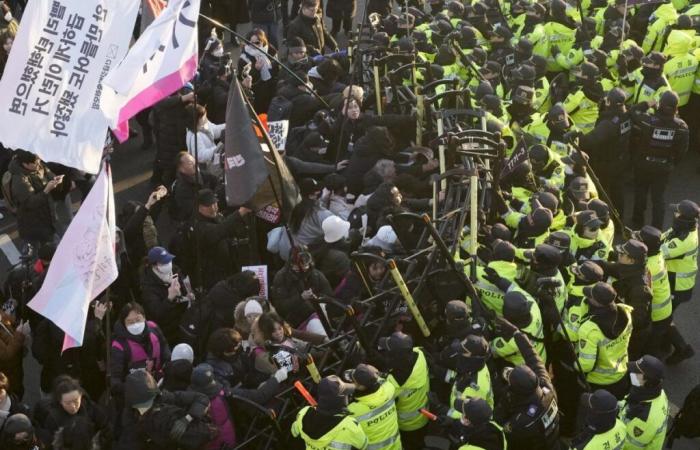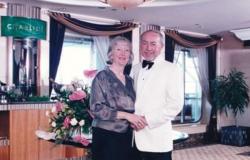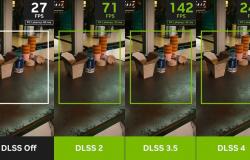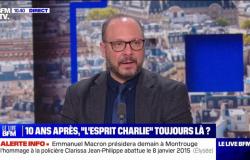South Korean investigators left the official residence of deposed President Yoon Suk Yeol on Friday after a nearly six-hour standoff in which Mr. Yoon defied their attempt to arrest him. This is the latest twist in the political crisis that is paralyzing South Korean politics.
The country's anti-corruption agency confirmed it had asked its investigators to leave the premises, after the presidential security detail barred them from entering Mr. Yoon's residence for hours. The agency cited concerns about the safety of its investigators to justify its decision.
The agency mentioned that its investigators, outnumbered, had several scuffles with the presidential security forces and expressed “serious regrets regarding the attitude of the suspect, who did not respect legal procedure.”
She acknowledged that Mr. Yoon's arrest would be “virtually impossible” as long as he is protected by the presidential security service. The agency plans to “strongly demand” that the country's acting leader, Vice Prime Minister Choi Sang-mok, order the department to comply with the execution of the arrest warrant.
Outside the residence, a large group of pro-Yoon protesters braved freezing temperatures for hours, waving South Korean and American flags, while chanting slogans promising to protect him.
The National Police Agency said it planned to investigate the head and deputy heads of the presidential security service on suspicion of obstructing their official duties and summoned them for questioning on Saturday.
Mr. Yoon, a former prosecutor, has resisted investigators' attempts to question him for weeks. The last time he reportedly left the residence was on December 12, when he visited the presidential office to make a televised statement to the nation, saying he would fight efforts to impeach him.
Investigators at the country's anti-corruption agency are considering rebellion charges after Mr. Yoon, apparently frustrated that his policies were being blocked by an opposition-dominated parliament, invoked martial law on Dec. 3 and sent troops to surround the National Assembly.
Parliament canceled the use of martial law a few hours later in a unanimous vote. He impeached Mr Yoon on December 14, accusing him of rebellion, while South Korean anti-corruption authorities and prosecutors opened separate investigations into the events.
Opposition to the search
A Seoul court on Tuesday issued an arrest warrant for Mr. Yoon and authorized a separate warrant to search his residence, but their enforcement is complicated as long as he remains at his official residence.
Mr. Yoon's lawyers, who filed a challenge to the warrant on Thursday, say it cannot be applied to his residence because of a law that protects places potentially linked to military secrets from being searched without consent. the person responsible.
The office said it would discuss further measures, but did not immediately say whether it would make another attempt to arrest Mr. Yoon. The detention warrant is valid for one week.
Mr. Yoon's lawyers also argued that the Senior Officials Corruption Investigation Bureau, which is conducting a joint investigation with police and military investigators, does not have the authority to investigate the accusations of rebellion. They believe the police do not have the legal authority to help arrest Mr. Yoon.
If investigators succeed in detaining Mr. Yoon, they will likely ask a court for permission to make a formal arrest. Otherwise, he will be released after 48 hours.
Obstruction of official duty
At a media briefing, an anti-graft agency official said its investigators were able to approach within 200 meters of Mr. Yoon's residence, but were hampered by a barricade comprising around ten vehicles and around 200 members of the presidential security forces.
The official, who spoke without being identified in accordance with agency rules, said three of his prosecutors were eventually allowed to approach the building but could not confirm whether Mr. Yoon was inside.
Although the Presidential Security Law mandates protection for Mr. Yoon, it does not authorize the Presidential Security Service to block court-ordered detentions, which would amount to undermining judicial authority, according to Park Seong -bae, lawyer specializing in criminal law.
Although the president generally enjoys immunity from prosecution while in office, this protection does not extend to allegations of rebellion or treason.
“It is highly likely that blocking the execution of a detention warrant constitutes an obstruction of official duty,” he argued.
The law requiring the consent of the responsible person before a search of places potentially linked to military secrets could continue to hamper Mr. Yoon's detention. Courts often require law enforcement officials to obtain search warrants with detainer warrants in case they need to search the site to locate the suspect, something the anti-corruption agency also did in its suit targeting Mr. Yoon.
Two dismissals
Thousands of police gathered outside Mr. Yoon's residence on Friday, forming a perimeter around a growing group of pro-Yoon protesters. No major clashes were reported in front of the residence.
Mr. Yoon's defense minister, police chief and several top military commanders have already been arrested for their roles during the martial law period.
Mr. Yoon's presidential powers have been suspended since the National Assembly voted to impeach him. His fate now rests in the hands of the Constitutional Court, which has begun deliberating whether to uphold his impeachment and formally remove him from office, or reinstate him in office.
At least six judges on the nine-member Constitutional Court are expected to vote in favor of his dismissal.
The National Assembly voted last week to remove Prime Minister Han Duck-soo, who became interim president after Yoon suspended his powers, over his reluctance to fill three vacant Constitutional Court posts before review of Mr. Yoon's case.
Facing growing pressure, new interim President Choi on Tuesday appointed two new judges, which could increase the chances that the court will uphold Mr. Yoon's impeachment.






